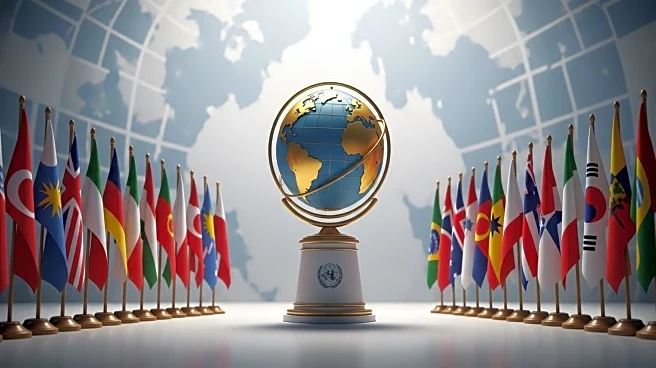What is the story about?
What's Happening?
During the United Nations General Assembly, various global leaders emphasized the need for institutional reform and global unity to address pressing challenges. William Ruto, President of Kenya, highlighted the importance of reimagining and renewing institutions to maintain relevance in the face of emerging realities. Alar Karis, President of Estonia, called for an end to prevailing brutality, while Cyril Ramaphosa, President of South Africa, urged a shift from warfare to poverty alleviation. Leaders from smaller nations, such as Surangel Whipps Jr. of Palau and Julius Maada Bio of Sierra Leone, stressed the significance of unity and equal sovereignty. The assembly showcased diverse perspectives on global issues, underscoring the interconnectedness of challenges faced by nations worldwide.
Why It's Important?
The discussions at the UN General Assembly highlight the critical need for reform in international institutions to effectively address global challenges such as conflict, poverty, and inequality. The call for unity and cooperation among nations is crucial in fostering peace and stability. Smaller nations' emphasis on equal sovereignty and justice reflects the growing demand for inclusive and equitable international relations. These dialogues can influence policy decisions and international collaborations, potentially leading to more effective solutions to global issues. The assembly serves as a platform for leaders to voice concerns and propose strategies that could shape future diplomatic and economic landscapes.
What's Next?
The next steps involve translating the discussions and proposals from the UN General Assembly into actionable policies and reforms. Leaders may engage in bilateral and multilateral negotiations to implement strategies for institutional reform and global cooperation. The emphasis on unity and shared responsibility could lead to new alliances and partnerships aimed at addressing specific challenges such as poverty and conflict. Monitoring the outcomes of these discussions will be essential to assess their impact on international relations and global governance.
Beyond the Headlines
The call for institutional reform and global unity at the UN General Assembly reflects deeper ethical and cultural dimensions. It highlights the need for a shift in global governance towards more inclusive and equitable systems. The emphasis on unity and cooperation suggests a potential cultural shift towards collective problem-solving and shared responsibility. This could lead to long-term changes in how nations interact and collaborate, fostering a more interconnected and resilient global community.















